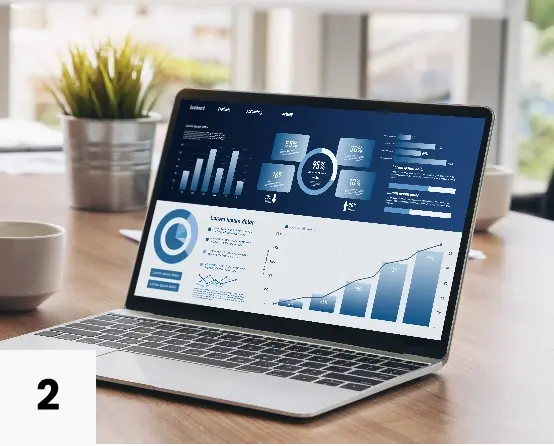SOLUTIONS
Demand Sensing Control Tower

Close the Gap Between Forecast and Fulfillment
PartnerLinQ’s Demand Sensing Control Tower provides the last-mile intelligence necessary to minimize forecast error in the short-term execution window (0–8 weeks).
PartnerLinQ is the ecosystem that delivers on this vision through four core capability pillars:

End-to-End
Connectivity
Seamlessly link high-velocity demand data (POS, e-commerce clicks) to immediate execution systems (WMS, Allocation, Replenishment).

Unified Data Model
High-frequency, granular demand data and inventory status reside on a single platform, eliminating data silos.

AI-Driven Intelligence
Leverage ML for real-time anomaly detection and micro-forecast adjustments to maximize the accuracy of the short-term demand signal.

Composability & Flexibility
The modular architecture allows the solution to be easily configured to incorporate unique short-term factors like competitor promotions or local traffic/weather feeds.
Industries
- Retail & Consumer Goods
- Foods & Beverage
- Apparel & Footwear
Features & Capabilities
PartnerLinQ’s Demand Sensing Control Tower specializes in consuming high-volume, low-latency data to execute rapid, intelligent adjustments and optimize immediate inventory deployment.
Real-Time Signal Ingestion: Consumes and processes high-velocity demand data (daily POS, order intake, inventory levels) to derive the most accurate short-term forecast.
Micro-Forecast Adjustment: Calculates system calculated suggestions (on a daily or weekly basis) to correct the consensus forecast, minimizing last-mile error.
OOS Situations Respected: Actively monitors and respects OOS situations at the store or DC level for forecast suggestions, prioritizing replenishment needs.

Refill Quantity Calculation: Automatically calculates and suggests refill quantities once SKU is available again, integrating inventory constraints into the short-term forecast.
Abnormal Scenario Alerting: Display abnormal scenarios (e.g., unexpected demand spike, short-term stockout risk, high order income vs. sensed demand) with the ability to directly dive into the details.
Forecast Adjustment to Stock: Supports forecast adjustment to actual stock level (e.g., if stock is lower than the actual forecast) to manage EOL models or constrained supply.

- Time-Series Variance Visualization: Provides visualization of differences between the versions (Sensed vs. Consensus Forecast) to understand the magnitude of the short-term correction aligned with your industry and organizational calendars.
- S&OP and S&OE Support: Our platform orchestrates end-to-end processes and approvals with configurable process queues and pre- built templates, ensuring alignment across your organization.
- Customized Execution Dashboards: Customized dashboards showing most relevant real-time informations, e.g., Top X Stockout Risk or Fill Rate by DC/Region.

Technology
A solution's technology vision must align with your organization’s future aspirations. PartnerLinQ’s modern, composable architecture ensures a planning solution that is not only powerful today but will scale to meet your evolving needs.
Cloud-Native & Multi-Cloud Architecture: Our scalable, cloud-native architecture is built for real-time data processing and analytics, ensuring fast performance and seamless operations. We support multi-cloud environments, providing the flexibility to align with your organization’s cloud strategy.
Composability: Built on an API-first and microservices architecture, our platform provides the extensibility and flexibility to adapt to your unique needs, helping you achieve a truly composable enterprise.

Intelligent Data Applications Framework: Our framework allows you to easily onboard and enrich external data sets and factors with AI-based predictions, creating a richer input signal for your control tower and accelerating the evolution of your digital intelligence with ease.
Extensive Prebuilt Adapters: We offer prebuilt, composable integration adapters for over 80 enterprise application platforms, including SAP, Oracle, Microsoft Dynamics 365, Microsoft Dynamics Business Central, Manhattan Active Omni and Salesforce.
Seamless Data Flow: Our bi-directional integration capabilities with ERP, TMS, WMS, MES, IoT, and external data sources ensure a continuous flow of real-time operational data for a single source of truth.
Trading Partner Network: Our native integration with your trading partner network allows for real-time data capture (e.g., daily POS data, low-latency inventory feeds), ensuring your control tower is always informed by the most current operational signals.

Custom Algorithm & Model Development: The platform provides a unified environment for in-house development of custom algorithms and models, giving your teams the tools to continuously evolve the solution (e.g., short-term demand prediction algorithms).
Third-Party Analytic Integration: Easily integrate third-party analytics and leverage public APIs to expand the control tower models and connect with external data sources (e.g., local weather, hyper-local marketing spend).
Industry Knowledge Graph and Data Models: PartnerLinQ’s industry data models and supply chain knowledge graph instantly enable out-of-the-box reporting, search, and proactive alerting capabilities to a whole new level of sophistication and extensibility.

User Experience
The user experience for Demand Sensing is centered on providing immediate, actionable alerts and micro-adjustments that guide allocation and fulfillment decisions.
Real-Time Exception Console: Displays prioritized alerts for potential short-term stockout risks or abnormal scenarios (e.g., high order income vs. sensed demand), enabling management by exception.
System Calculated Action Prompts: Provides system calculated suggestions for refill quantities and inventory rebalancing, minimizing manual intervention.
Granular Data Visibility: Allows users to deep dive into the lowest hierarchy level for a selectable timeframe to validate the micro-adjustment reason.

Generative AI Narratives: GenAI provides contextual narratives explaining why the sensed demand is different from the forecast and the recommended immediate action.
Prescriptive Recommendations: Provides quantified recommendations for inventory re-allocation and replenishment based on immediate demand signals.


Implementation Advantage
Implementation is focused on quickly activating high-frequency data feeds and configuring the anomaly detection engine for immediate reduction of short-term forecast error.
High-Frequency Data Integration: Expedited connection and ingestion of POS, inventory, and order intake data (the fastest moving data) to enable real-time signal ingestion.
Short-Term Model Configuration: Quick setup and calibration of the ML models used for micro-forecast adjustment and short-term anomaly detection.
OOS/Refill Logic Setup: Implementation includes setting up the rules to respect OOS situations and automatically calculate and suggest refill quantities.
KPI Alignment: Immediate tracking of key short-term execution metrics, including Fill Rate %, On-Shelf Availability (OSA) %, and Wastage Reduction %.
End Result & Business Benefit
PartnerLinQ’s Demand Sensing Control Tower delivers operational agility and execution precision, directly translating real-time demand into superior fulfillment performance.
Maximized Execution Accuracy: Significantly improves short-term Forecast Accuracy % in the 0-8 week window, minimizing the chance of costly fulfillment errors.
Increased Customer Service: Achieves higher On-Shelf Availability (OSA) % and Fill Rate % by ensuring inventory is precisely allocated based on immediate demand.
Reduced Expedite Costs: Lowers reactive costs by minimizing the need for expedited shipping or emergency transfers that result from short-term forecast failures.
Wastage Reduction: Reduces inventory obsolescence and Wastage Reduction % (especially for perishables or fast fashion) by matching supply to dynamically sensed demand.

Other Related Solutions from PartnerLinQ
Resources
FAQs
How resilient and agile is your supply chain?
If you encounter unexpected disruptions, lack of automation, and changing consumer attitudes, you’re not alone.
PartnerLinQ makes it easy to integrate with legacy and cloud-based systems that allow you to increase productivity across your business’s workflows.
Want to see how PartnerLinQ connects all your information sources, including XML, JSON, EDI and Non-EDI, to reduce manual work substantially?


